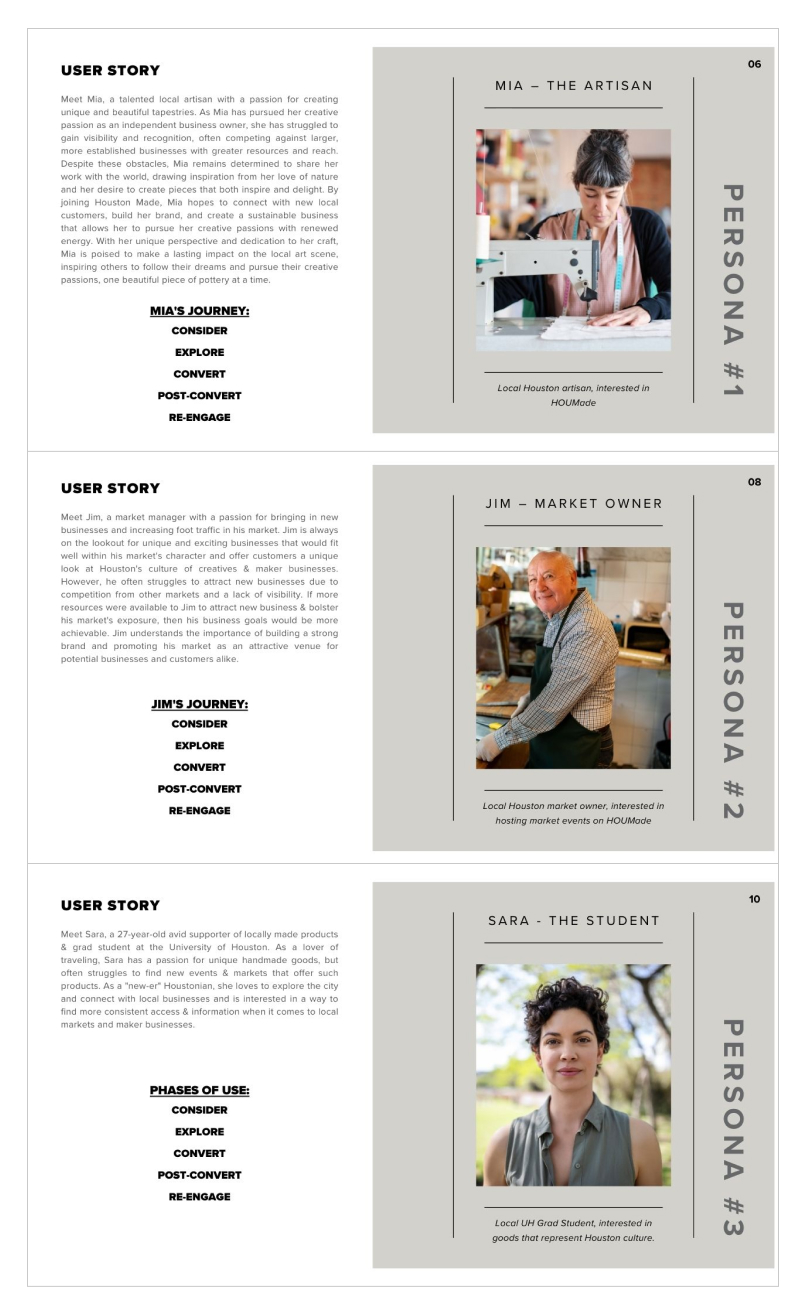
Houston Made (HOU Made)
Building the Digital Hub for Houston Makers
Client Overview
Houston Made, abbreviated as HOU Made, is a local initiative backed by Houston Community College in partnership with the West Houston Institute. Inspired by successful maker-focused programs like "Made in NYC" and "Made in LA," HOU Made aimed to support local makers, startups, and small manufacturers in Houston by providing them with resources and a digital platform to showcase their work. This initiative also sought to connect Houston’s diverse market communities with the public, fostering economic growth and collaboration.
The initiative targeted two main groups:
- Local businesses and makers who lacked the budget or resources to create their own websites.
- The broader Houston community, looking for locally crafted goods and services.
The platform was designed to offer these businesses a digital presence and access to community resources such as webinars, seminars, and conferences.
Project Goals and Objectives
HOU Made approached us with clear objectives:
- Develop a Membership-Based Website
Enable local makers and markets to sign up, create public profiles, and manage their information independently. - Promote Houston’s Unique Identity
Build a platform that authentically represents Houston’s maker culture without being perceived as just another college program. - Support Small Businesses
Provide resources, SEO visibility, and legitimacy to small businesses, helping them grow and thrive in the local market. - Facilitate Community Connection
Create a user-friendly experience that connects local markets, makers, and consumers.
Approach
Discovery Phase
We started with extensive stakeholder interviews, including leaders at Houston Community College and prospective users of the platform. We also reviewed existing market research to identify user needs and benchmarked similar programs in other cities, such as Nashville and San Diego.
Key insights from this phase included the need for the initiative to stand out as a community-driven platform rather than a college program. User personas were developed for three primary audiences: local customers, makers, and community partners.
From those personas, we crafted journeys that could be used to envision a user's process of "Consideration", "Exploration", "Conversion", "Post-Conversion" and "Re-Engagement" through the website from multiple perspectives. This helped us define touchpoints, conversion flows, a sitemap and what we would need to design early on.
Design Phase
The platform was designed with a mobile-first approach, keeping in mind that end-users would likely access the platform on-the-go.
For local customers, we focused on easy navigation to discover local markets and businesses.
For makers, we designed straightforward user flows for creating and managing profiles, resources, and events.
For community partners, we developed tools for event creation and sharing resources.
Branding elements such as Houston-inspired colors and fonts were integrated to give the platform a local identity. Wireframes and user flows were developed and iteratively tested with stakeholders and user groups to ensure a seamless experience.
Design Phase Cont'd - Mockups




Development Phase
The website was built on WordPress, utilizing the BuddyBoss framework for its membership and community functionality. Key backend developments included custom user roles and permissions to allow makers, markets, and community partners to manage content specific to their roles. Administrators had workflows to approve content, ensuring quality control.
Responsive frontend development was prioritized, with iterative testing conducted via recorded Zoom sessions where users interacted with the platform and provided feedback. Challenges were addressed by simplifying user flows and removing unnecessary BuddyBoss features to streamline usability.
Launch and Support
The project was rolled out in phases.
The soft launch included a conference to introduce the platform to local makers, allowing select users to onboard and provide initial feedback.
The full launch made the site accessible to the public, enabling users to search for local businesses, events, and markets.
To support ongoing use, we provided hands-on training sessions for staff, recorded Loom videos, and detailed documentation for technical support. Admin workflows were established for content approval.
Results and Impact
Community Engagement
The maker community expressed excitement about the platform, noting its potential to connect local businesses with new customers and resources. Multiple conferences held during the rollout phase were sold out, demonstrating strong interest in the initiative.
Initial Adoption
Within the first three months, 50 businesses signed up for the platform. While this fell short of the first-year goal of 100 businesses, it highlighted a strong demand for such a resource.
Challenges Overcome
Many small businesses lacked the assets (e.g., logos, descriptions) to complete their profiles. To address this, Houston Community College provided additional support to onboard these users and prepare for future phases.
Key Takeaways
This project showcased the importance of iterative design and development to accommodate diverse user needs. By simplifying the platform and focusing on community engagement, HOU Made successfully launched a resource that fosters growth in Houston’s maker economy.
Future Plans
The platform’s second phase will include advanced features to further support businesses and events, with plans to onboard more users as internal staffing challenges are resolved.


